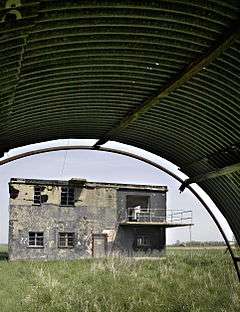Ludham
| Ludham | |
 RAF Ludham Control Tower, 2008 |
|
 Ludham |
|
| Area | 12.18 km2 (4.70 sq mi) |
|---|---|
| Population | 1,278 (2011) |
| – density | 105/km2 (270/sq mi) |
| OS grid reference | TG389183 |
| Civil parish | Ludham |
| District | North Norfolk |
| Shire county | Norfolk |
| Region | East |
| Country | England |
| Sovereign state | United Kingdom |
| Post town | GREAT YARMOUTH |
| Postcode district | NR29 |
| Police | Norfolk |
| Fire | Norfolk |
| Ambulance | East of England |
| EU Parliament | East of England |
Coordinates: 52°42′36″N 1°32′08″E / 52.70988°N 1.53551°E
Ludham is a village and civil parish in the English county of Norfolk, in The Broads, at the end of a dyke leading to Womack Water and flowing into the River Thurne. It lies 1.5 miles (2.4 km) to the East of Ludham Bridge, which is on the River Ant. It covers an area of 12.18 km2 (4.70 sq mi) and had a population of 1,301 in 582 households at the 2001 census,[1] the population reducing to 1,278 at the 2011 census.[2] For the purposes of local government, it falls within the district of North Norfolk.
It is part of the Ludham - Potter Heigham NNR, a national nature reserve.
The village gave its name to a Ham class minesweeper, HMS Ludham and also, in geology, to an age/stage (the Ludhamian) in the British regional subdivision of the Pleistocene Series/Epoch. It also effectively gives its name to the preceding age/underlying stage known as the Pre-Ludhamian.[3][4]
RAF Ludham
Ludham was transferred from No. 12 Group RAF to the Admiralty on 24 August 1944 and occupied by the Mobile Naval Airfields Organisation. RNAS Ludham was commissioned as HMS Flycatcher, RNAS Ludham on 4 September under the command of the Senior Officer Mobile Naval Airfields Organisation. At Ludham the MNAO assembled and despatched the first five Mobile Naval Air Bases (MONAB) and one "Transportable Aircraft Maintenance Yard" (TAMY). Flycatcher moved from Ludham to RAF Middle Wallop which was more advantageous to shipping the assembled units to the Far East. In return the RAF took Ludham on again.[5]
Film location
Ludham was one of the film locations for the 1954 movie "Conflict of Wings" starring John Gregson and Muriel Pavlow. Adapted from the novel by Don Sharp, the story takes place in a Norfolk country village where the locals decide to fight against a proposal to build a rocket range on a bird sanctuary.[6]
Filming took place in the village centre and shows many buildings and features (including the Bakers Arms pub and the very narrow main road through the village) which no longer exist.
A photograph showing filming and more information about Ludham can be accessed at the Ludham Community Archive website http://www.ludhamarchive.org.uk/nita.htm
Notable residents
- Edward Seago, the landscape artist lived in the village at the Grade II listed Dutch House.[7][8]
External links
| Wikimedia Commons has media related to Ludham. |
Notes
- ↑ Census population and household counts for unparished urban areas and all parishes. Office for National Statistics & Norfolk County Council (2001). Retrieved 20 June 2009.
- ↑ "Civil Parish population 2011". Retrieved 3 September 2015.
- ↑ http://thesciencedictionary.org/ludhamian/
- ↑ http://www.geo-east.org.uk/spages/norfolk.htm
- ↑ "Flycatcher (1) Ludham". Archived from the original on 25 May 2012.
- ↑ Britmovie (2)
- ↑ The Dutch House Retrieved 18 June 2011
- ↑ Edward Seago Retrieved 18 June 2011